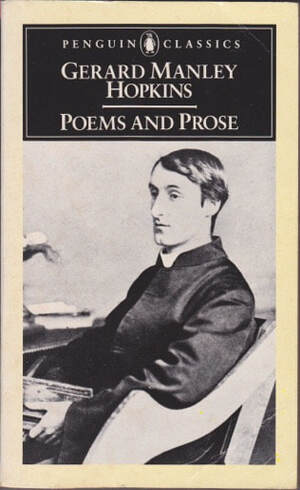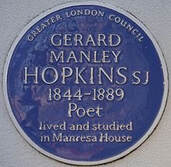PIED BEAUTY
Glory be to God for dappled things –
For skies of couple-colour as a brinded cow;
For rose-moles all in stipple upon trout that swim;
Fresh-firecoal chestnut-falls; finches’ wings;
Landscape plotted and pieced – fold, fallow, and plough;
And áll trádes, their gear and tackle and trim.
All things counter, original, spare, strange;
Whatever is fickle, freckled (who knows how?)
With swift, slow; sweet, sour; adazzle, dim;
He fathers-forth whose beauty is past change:
Praise him.
Glory be to God for dappled things –
For skies of couple-colour as a brinded cow;
For rose-moles all in stipple upon trout that swim;
Fresh-firecoal chestnut-falls; finches’ wings;
Landscape plotted and pieced – fold, fallow, and plough;
And áll trádes, their gear and tackle and trim.
All things counter, original, spare, strange;
Whatever is fickle, freckled (who knows how?)
With swift, slow; sweet, sour; adazzle, dim;
He fathers-forth whose beauty is past change:
Praise him.
Gerard Manley Hopkins (1846-1889)
As we spend more time in our gardens these days “in vacant or in pensive mood”. Are not our senses awakened by pied beauty and charged with the grandeur of God’s creation.
Gerard Manley Hopkins’, “Pied Beauty” points to the poet’s power of serious appreciation of the beauty of things around him, his poetic concentration, compassion and above all his unquestioning faith in God.
Gerard Manley Hopkins’, “Pied Beauty” points to the poet’s power of serious appreciation of the beauty of things around him, his poetic concentration, compassion and above all his unquestioning faith in God.
| He believed that created beauty is a reflection of God, and the beauty of nature is constantly reborn and renewed. Nature has been polluted and violated by man’s industrial activities (how contemporary is that!) Yet the beauty of nature is never exhausted because,” the world is charged with the grandeur of God.” Gerald Manley Hopkins (1846-1889) was an English poet and a Jesuit priest whose posthumous fame established him among the leading Victorian poets. His manipulation of “prosody” particularly his concept of “sprung rhythm” and use of imagery established him as an innovative writer of verse. Two of his major themes were nature and religion. Only after his death did a friend, Robert Bridges begin to publish a few of Hopkins’ mature poems in anthologies, hoping to prepare the way for a wider acceptance of his style. By 1930 his work was recognised as one of the most accomplished literary accomplishments of the 19th century. It had a marked influence on such leading 20th century poets as T. S. Elliot, Dylan Thomas and W. H. Auden. |
Right Rev. Monsignor James Ryan


 RSS Feed
RSS Feed